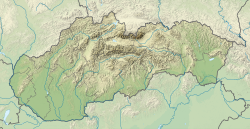Bodíky
Bodíky
Nagybodak | |
|---|---|
 | |
Location of Bodíky in the Trnava Region Location of Bodíky in Slovakia | |
| Coordinates: 47°55′N 17°28′E / 47.92°N 17.46°E | |
| Country | |
| Region | |
| District | Dunajská Streda District |
| First mentioned | 1272 |
| Government | |
| • Mayor | Tamas Vilagi (Party of the Hungarian Coalition) |
| Area | |
• Total | 24.75 km2 (9.56 sq mi) |
| Elevation | 119 m (390 ft) |
| Population (2021)[3] | |
• Total | 292 |
| Ethnicity | |
| • Hungarians | 96.53% |
| • Slovaks | 1.58% |
| Time zone | UTC+1 (CET) |
| • Summer (DST) | UTC+2 (CEST) |
| Postal code | 930 29[2] |
| Area code | +421 31[2] |
| Car plate | DS |
| Website | www |
Bodíky (Hungarian: Nagybodak, pronounced [ˈnɒɟbodɒk]) is a village and municipality in the Dunajská Streda District in the Trnava Region of south-west Slovakia.
It has a public water-supply system and sewage system connected to sewage disposal plant. There is a football playground and a public library in the village.
History
[edit]Until the end of World War I, it was part of Hungary. In the 15th century, the village belonged to the Pressburg Castle. After the 17th century the Amadé, Kánya, Cseszneky and Pálffy families were the most important land-owners in the village.
The village administratively fell within the Dunaszerdahely district of Pozsony County in the Kingdom of Hungary. After the Austro-Hungarian army disintegrated in November 1918, Czechoslovak troops occupied the area. Under the Treaty of Trianon of 1920, it became officially part of Czechoslovakia and fell within Bratislava County until 1927. In November 1938, the First Vienna Award granted the area to Hungary and it was held by Hungary until 1945. After Soviet occupation in 1945, Czechoslovak administration returned and the village became officially part of Czechoslovakia by the Paris Peace Treaties in 1947.
Notable Locations
[edit]- Kráľovská lúka - Nature monument
- Zvonica - Religious Chapel
- Prícestný kríž - Memorial
See also
[edit]References
[edit]- ^ "Hustota obyvateľstva - obce [om7014rr_ukaz: Rozloha (Štvorcový meter)]". www.statistics.sk (in Slovak). Statistical Office of the Slovak Republic. 2022-03-31. Retrieved 2022-03-31.
- ^ a b c "Základná charakteristika". www.statistics.sk (in Slovak). Statistical Office of the Slovak Republic. 2015-04-17. Retrieved 2022-03-31.
- ^ "Počet obyvateľov podľa pohlavia - obce (ročne)". www.statistics.sk (in Slovak). Statistical Office of the Slovak Republic. 2022-03-31. Retrieved 2022-03-31.
- ^ "Bilancia podľa národnosti a pohlavia - SR-oblasť-kraj-okres, m-v [om7002rr]". www.statistics.sk (in Slovak). Statistical Office of the Slovak Republic. 2022-03-31. Retrieved 2025-05-01.
Genealogical resources
[edit]The records for genealogical research are available at the state archive "Štátny Archív in Bratislava, Slovakia"
- Roman Catholic church records (births/marriages/deaths): 1676-1912 (parish B)
- Lutheran church records (births/marriages/deaths): 1823-1946 (parish B)
- Reformated church records (births/marriages/deaths): 1823-1946 (parish B)



